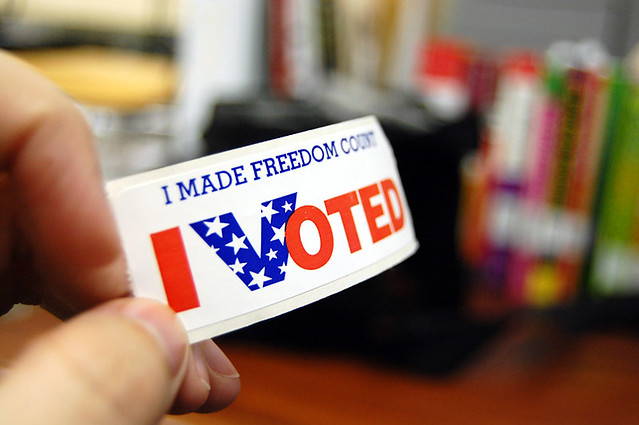
Facebook Inc. will make its rules on political advertising stricter to prevent the spread of disinformation on the run-up to the 2020 U.S. elections, the company announced Wednesday.
The social media giant was heavily criticized for allowing Russian interference in the 2016 presidential election and can’t afford to allow that to happen again this time around.
Since then Facebook has made some changes, including a new authorization process for anyone placing a political ad. Ads are also stored in Facebook’s “Ad Library” for a number of years.
In a post, Katie Harbath, Facebook’s public policy director of global elections, and product manager Sarah Schiff wrote that Americans should know who’s influencing their elections. The post states that a lot has already been done to ensure “transparency and authenticity” and the rules on political ads just became even stricter.
Part of the authorization process already in place requires that organizations write a “paid for by disclaimer.” But Facebook said this has been taken advantage of and sometimes it’s not clear who paid for the ad.
Indeed, it was discovered recently that someone had managed to get around Facebook’s new rules and advertise without disclosing who was actually behind a banned organization publishing specious and conspiracy-oriented content run by Chinese-Americans. Facebook’s Ad Library has also come under the spotlight, with the New York Times in July citing researchers that said the library is flawed, buggy and doesn’t really work.
There was also the case of Vice News proving it was capable of taking ads out under the name of Mike Pence and U.S. senators as well as the Islamic State. Such slackness after the 2016 debacle left the social media company with a lot of egg to scrape off its face.
Facebook has said it’s working on some issues, although the company has been criticized for its foibles concerning ads. Senator Mark Warner, one of three senators pushing for “the Honest Ads Act,” said that given Facebook’s resources there’s no excuse for shoddy work. The latest changes might be a reaction to the recent criticism.
“Starting mid-September, advertisers will need to provide more information about their organization before we review and approve their disclaimer,” said Facebook. “If they do not provide this information by mid-October, we will pause their ads.”
Larger organizations will have to show a tax number, a government website domain that matches an email ending in .gov or .mil, or a Federal Election Commission identification number. An “I” icon will appear with the ad and a notice that this is a “Confirmed Organization.”
Smaller entities, said Facebook, such as businesses and local politicians can provide a “verifiable phone number, business email, mail-deliverable address and a business website with a domain that matches the email.” The “I” icon will again appear, but this time people will see “About this ad.”
“The ‘I’ icons help people on Facebook and Instagram better understand who’s trying to influence them and why,” said Facebook. “Now, with one tap, people will not only see information about the ad, but they’ll be able to see the information Facebook confirmed, such as whether an advertiser used an EIN or FEC identification number.”
The company also said it’s updating its “social issues list” to include 10 acceptable categories instead of 20 subjects that will reflect sociopolitical topics in the U.S. Issues lists have been created in the past in other countries that have had elections.
“We’ll continue to capture a range of topics encompassed by the 10 referenced categories,” said Facebook. “For instance, in the Civil and Social Rights category, we will continue to proactively detect and review ads on topics like freedom of religion, LGBTQ rights and women’s rights.”
The new rules have been called “baby steps” by some, and Facebook admits that this is a work in process. It’s still working on enhancing the Ad Library, banning any ads that discourage voting and continuously monitoring political ads despite the aforementioned embarrassing issues.
“While our efforts to protect elections are ongoing and won’t be perfect, they will make it harder for advertisers to obscure who is behind ads and will provide greater transparency for people,” Facebook said. It added that it cannot tackle this problem alone and hopes that it can work with governments and other organizations to implement “sensible regulation” down the line.
Photo: Kelly Minors/Flickr
Since you’re here …
… We’d like to tell you about our mission and how you can help us fulfill it. SiliconANGLE Media Inc.’s business model is based on the intrinsic value of the content, not advertising. Unlike many online publications, we don’t have a paywall or run banner advertising, because we want to keep our journalism open, without influence or the need to chase traffic.The journalism, reporting and commentary on SiliconANGLE — along with live, unscripted video from our Silicon Valley studio and globe-trotting video teams at theCUBE — take a lot of hard work, time and money. Keeping the quality high requires the support of sponsors who are aligned with our vision of ad-free journalism content.
If you like the reporting, video interviews and other ad-free content here, please take a moment to check out a sample of the video content supported by our sponsors, tweet your support, and keep coming back to SiliconANGLE.